
REVUE DES LANGUES ROMANES
metrics 2024
Advancing Interdisciplinary Insights in Linguistics
Introduction
REVUE DES LANGUES ROMANES is an esteemed academic journal published in France, dedicated to the study of Romance languages, linguistics, and literary theory. With an ISSN of 0223-3711, this journal has transitioned to an Open Access model since 2022, broadening accessibility and encouraging collaborative research across disciplines. It serves as a platform for researchers, professionals, and students to explore the intricacies of language and literature within the broader context of arts and humanities. Notably, REVUE DES LANGUES ROMANES has achieved Q4 quartile rankings in 2023 for its contributions to Archaeology, Linguistics, and Literature, reflecting its commitment to fostering scholarly dialogue, despite its emerging status in the academic landscape. With a focus on interdisciplinary approaches, the journal invites innovative insights and critical analyses that further understanding in these fields, promoting the depth and richness of Romance languages and their cultural implications.
Metrics 2024
 0.10
0.10 -
- 0.10
0.10 3
3Metrics History
Rank 2024
Scopus
JCI (Web Of Science)
Quartile History
Similar Journals

Theleme-Revista Complutense de Estudios Franceses
Unlocking the Richness of French Language and LiteratureTheleme-Revista Complutense de Estudios Franceses is a distinguished academic journal published by UNIV COMPLUTENSE MADRID, SERVICIO PUBLICACIONES, dedicated to the exploration of French studies within the fields of linguistics and literature. With an ISSN of 1139-9368 and an E-ISSN of 1989-8193, this journal has proudly maintained its Open Access policy since 1992, ensuring that scholarly research is accessible to a global audience. Based in Spain, the journal is committed to advancing knowledge and fostering discussion in French linguistic and literary theory, as evidenced by its publication history from 2019 to 2024. Despite its current classification in the Q4 quartile for both Linguistics and Literature and Literary Theory as of 2023, Theleme is positioned to grow in its academic influence, reflecting trends in interdisciplinary research. The journal’s rankings in Scopus underscore its unique contributions and the importance of its discourse in the arts and humanities. Researchers, professionals, and students are encouraged to engage with Theleme as a resource for innovative ideas and comprehensive studies that navigate the rich landscape of French language and literature.
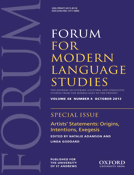
FORUM FOR MODERN LANGUAGE STUDIES
Elevating Research in Literature and LinguisticsFORUM FOR MODERN LANGUAGE STUDIES is a prestigious academic journal published by Oxford University Press that has been serving the fields of literature and linguistics since its inception in 1965. This journal, with an ISSN of 0015-8518 and an E-ISSN of 1471-6860, plays a crucial role in advancing scholarly discourse on modern language studies, including literature and literary theory. With an impactful presence in both the linguistic and literary domains, it has been recognized in 2023 with a category ranking of Q2 in Literature and Literary Theory and Q3 in Linguistics and Language. It stands out in the competitive landscape, holding a notable position within Scopus rankings, including a 70th percentile ranking in Literature & Literary Theory. While the journal currently does not offer open access options, it remains a vital resource for researchers, educators, and students passionate about the transformative power of language and literature. Its commitment to quality research and robust academic discussion underscores its importance, making it a key platform for those aiming to contribute to modern language scholarship.
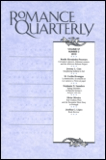
ROMANCE QUARTERLY
Exploring the Heart of Cultural NarrativesROMANCE QUARTERLY is an esteemed journal published by Routledge Journals, Taylor & Francis Ltd, focusing on critical discussions and innovative research in the fields of Cultural Studies and Literature and Literary Theory. With its inception in 1986, this journal has diligently documented the evolving landscape of romance literature, making significant contributions through interdisciplinary approaches that resonate across literature and cultural scholarship. Holding a commendable position in academic rankings, it is classified in the second quartile for Literature and Literary Theory, and in the third quartile for Cultural Studies as of 2023, highlighting its relevance and impact within these domains. While it operates under a traditional access model, the required scholarly discourse and access to contemporary studies make it a crucial resource for researchers, educators, and students alike. ROMANCE QUARTERLY serves not merely as a platform for publishing but as a vibrant hub for the exploration and analysis of romance narratives, offering invaluable insights into their impact on cultural and societal constructs, surely a must-read for anyone passionate about these subjects.

Miscelanea de Estudios Arabes y Hebraicos-Seccion Hebreo
Fostering Cultural Understanding Through Open Access ResearchMiscelanea de Estudios Arabes y Hebraicos-Seccion Hebreo is a distinguished interdisciplinary journal published by Universidad de Granada, Editorial, focusing on the intricate fields of Arabic and Hebrew studies. Established in 1955, this open-access journal promotes scholarly discourse and research, allowing free access to its articles, which enhances the dissemination of knowledge. With an ISSN of 1696-585X and an E-ISSN of 2340-2547, the journal has garnered attention in various academic categories, reflecting its relevance and impact: achieving Q2 rankings in both Literature and Literary Theory and Religious Studies, as well as a Q3 ranking in Cultural Studies and History as of 2023. Operating from its base in Granada, Spain, Miscelanea de Estudios Arabes y Hebraicos-Seccion Hebreo contributes significantly to the advancement of cultural understanding, and its accessibility since its inception underscores its commitment to fostering academic excellence. Researchers, professionals, and students interested in the rich interplay between linguistic, cultural, and historical contexts will find this journal an invaluable resource for their studies.
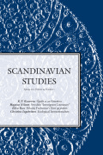
SCANDINAVIAN STUDIES
Advancing Scholarship in Scandinavian Linguistics and LiteratureSCANDINAVIAN STUDIES is a prestigious journal dedicated to advancing the understanding of Scandinavian languages, literature, and culture. Published by the Society for the Advancement of Scandinavian Studies in the United States, this journal has been a key resource for scholars since its inception in 1974, covering a breadth of topics in both Linguistics and Literary Theory. With an impactful presence within academic circles, it has achieved a notable ranking in the Q2 category for Literature and Literary Theory, and Q3 for Linguistics and Language, ensuring its relevance among leading journals in the humanities. The journal is indexed in reputable databases, including Scopus, where it ranks in the 65th percentile for literature studies. Although it is not open access, SCANDINAVIAN STUDIES provides critical insights and scholarly contributions that greatly enhance discourse in Scandinavian studies. Researchers, professionals, and students alike will find this journal a valuable tool for deepening their understanding of the rich tapestry of Scandinavian contributions to world culture.

Remate de Males
Unveiling the Complexities of CommunicationRemate de Males is a distinguished academic journal that has been enriching the field of linguistics and language studies since its inception by the UNIV ESTADUAL CAMPINAS, INST ESTUDOS LINGUAGEM in Brazil. With an ISSN of 0103-183X and an E-ISSN of 2316-5758, this journal has embraced the Open Access model since 1980, allowing greater accessibility and dissemination of research findings to a global audience. It plays a crucial role in fostering scholarly dialogue and advancing knowledge in linguistic theory, language acquisition, and related disciplines. The journal welcomes contributions from researchers, professionals, and students, aiming to provide a platform for innovative ideas and discussions that push the boundaries of language studies. By continually prioritizing high-quality peer-reviewed content, Remate de Males remains a vital resource for anyone interested in the complexities of language and communication.
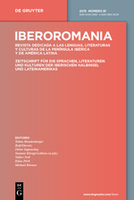
IBEROROMANIA
Unveiling Complexities in Linguistics and Literary NarrativesIBEROROMANIA, published by WALTER DE GRUYTER GMBH, stands as a pivotal journal in the fields of Linguistics and Language and Literature and Literary Theory. Since its inception in 1969, IBEROROMANIA has facilitated scholarly discourse by providing a platform for cutting-edge research that explores the complexities of Romance languages and their literatures. The journal is recognized for its valuable contributions, currently holding a Q3 quartile ranking in Linguistics and Language and a Q2 ranking in Literature and Literary Theory as of 2023. With its diverse scope spanning several years, including works from 1970 to 2024, IBEROROMANIA is pivotal for researchers, professionals, and students alike, fostering a deeper understanding of Romantic linguistic and literary frameworks. Although it does not provide open access, its impact in the Arts and Humanities is underscored by its Scopus rankings, reflecting a commitment to high-quality scholarship. For those dedicated to exploring the nuances of Romance languages and literature, IBEROROMANIA is an indispensable resource.

Studi Slavistici
Unveiling the Rich Tapestry of Slavic LiteratureStudi Slavistici is an esteemed academic journal published by FIRENZE UNIV PRESS, focusing on the rich and diverse fields of Cultural Studies, Linguistics and Language, and Literature and Literary Theory. Since its initiation in 2004, it operates under an Open Access model, providing unrestricted access to its contents and fostering a wider dissemination of research. Based in Italy, this journal serves as a vital platform for scholars and researchers engaged in Slavic studies and beyond, encouraging interdisciplinary dialogue and innovative approaches. With its current Quartile rankings in the Q4 category across various domains, it plays a significant role in shaping dialogues within the academic community while offering insights into contemporary and historical perspectives. By maintaining an inclusive vision and engaging with critical issues, Studi Slavistici remains dedicated to advancing knowledge and scholarship in these intricate fields.

RIVISTA DI LETTERATURE MODERNE E COMPARATE
Advancing Scholarship in Modern and Comparative LiteratureRIVISTA DI LETTERATURE MODERNE E COMPARATE is a distinguished academic journal published by PACINI EDITORE in Italy, dedicated to the exploration of modern and comparative literature. With an ISSN of 0391-2108, this journal serves as an essential resource for scholars and practitioners engaged in the ever-evolving fields of literature and literary theory. Although the journal currently falls into the Q4 quartile category for 2023, it aims to foster a rich dialogue among researchers, practitioners, and students by publishing innovative and diverse perspectives on contemporary literary issues. The journal is indexed in Scopus, ranking #1045 out of 1106 in the subject area, indicating a niche, yet critical contribution to the literature landscape. Covering converged years from 2002 to 2013 and 2017 to 2024, RIVISTA DI LETTERATURE MODERNE E COMPARATE is vital for those looking to delve deeper into literary analytic methodology and comparative studies, providing an avenue for both new research and established discourse.
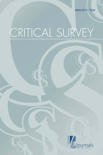
Critical Survey
Unveiling Insights at the Intersection of Theory and CultureCritical Survey, published by BERGHAHN JOURNALS, is a distinguished academic journal that focuses on the dynamic intersections of Cultural Studies and Literature and Literary Theory within the arts and humanities landscape. With an ISSN of 0011-1570 and E-ISSN 1752-2293, this journal serves as a crucial platform for scholars, offering original research and critical essays that delve into contemporary cultural and literary debates. Based in the United Kingdom, it enjoys a solid reputation as evidenced by its 2023 Scopus rankings, placing it in the Q3 category for Cultural Studies and Q2 for Literature and Literary Theory. While it does not currently offer open access options, the journal is committed to maintaining high academic standards and fostering intellectual exchange through its published content, inclusive of articles that span a range of topics relevant to critical survey methodologies. As it continues to converge from 2012 to 2024, Critical Survey remains an invaluable resource for researchers, professionals, and students engaged in the evolving discourse of cultural and literary analysis.